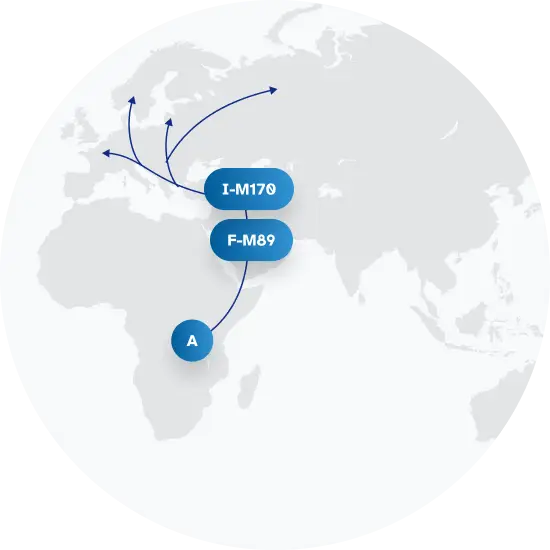Explore the Family Name Cornell
How common is the last name Cornell in the United States?
Based on the Decennial U.S. Census data, the surname 'Cornell' saw a slight shift in its popularity between 2000 and 2010. In 2000, it ranked 1566th in prevalence among American surnames, but by 2010 it had slipped to 1672nd place, marking a minor decline of 6.77%. However, the total count of people bearing the surname 'Cornell' actually increased during this period from 21,060 to 21,558, representing a growth of 2.36%.
| 2000 | 2010 | Change | |
|---|---|---|---|
| Rank | #1,566 | #1,672 | -6.77% |
| Count | 21,060 | 21,558 | 2.36% |
| Proportion per 100k | 7.81 | 7.31 | -6.4% |
Race and Ethnicity of people with the last name Cornell
The Decennial U.S. Census also provides insights into the ethnic identity associated with the surname 'Cornell'. As of 2010, the majority of individuals carrying this surname identified as White, although this proportion decreased slightly from 90.94% in 2000 to 88.57% in 2010. Other ethnic identities saw increases during this period: those identifying as Asian/Pacific Islander grew by 39.13%, those reporting two or more races rose by 29.86%, and the proportion identifying as Hispanic increased by 43.88%. Additionally, there were modest increases amongst those identifying as Black (15.58%) and American Indian and Alaskan Native (24.07%). Please note that some data might have been suppressed for privacy.
| 2000 | 2010 | Change | |
|---|---|---|---|
| White | 90.94% | 88.57% | -2.61% |
| Black | 4.43% | 5.12% | 15.58% |
| Hispanic | 1.96% | 2.82% | 43.88% |
| Two or More Races | 1.44% | 1.87% | 29.86% |
| Asian/Pacific Islander | 0.69% | 0.96% | 39.13% |
| American Indian and Alaskan Native | 0.54% | 0.67% | 24.07% |
Cornell ancestry composition
23andMe computes an ancestry breakdown for each customer. People may have ancestry from just one population or they may have ancestry from several populations. The most commonly-observed ancestry found in people with the surname Cornell is British & Irish, which comprises 47.0% of all ancestry found in people with the surname. The next two most common ancestries are French & German (27.4%) and Eastern European (5.0%). Additional ancestries include Scandinavian, Italian, Ashkenazi Jewish, Spanish & Portuguese, and Greek & Balkan.
Ready to learn more about your ancestry? Get the most comprehensive ancestry breakdown on the market by taking our DNA test. Shop 23andMe
| ANCESTRY BREAKDOWN | COMPOSITION |
|---|---|
| British & Irish | 47.0% |
| French & German | 27.4% |
| Eastern European | 5.0% |
| Other | 20.6% |

Possible origins of the surname Cornell
Your DNA provides clues about where your recent ancestors may have lived. Having many distant relatives in the same location suggests that you may all share common ancestry there. Locations with many distant relatives can also be places where people have migrated recently, such as large cities. If a large number of individuals who share your surname have distant relatives in a specific area, it could indicate a connection between your surname and that location, stemming from either recent ancestral ties or migration.
Based on 23andMe data, people with last name Cornell have recent ancestry locations in the United Kingdom of Great Britain and Northern Ireland and Ireland.
| RECENT ANCESTRY Location | Percentage |
|---|---|
| Greater London, United Kingdom | 85.70% |
| Glasgow City, United Kingdom | 85.50% |
| West Midlands, United Kingdom | 85.50% |
| Greater Manchester, United Kingdom | 85.50% |
| Merseyside, United Kingdom | 85.30% |
What Cornell haplogroups can tell you
Haplogroups are genetic population groups that share a common ancestor on either your paternal or maternal line. These paternal and maternal haplogroups shed light on your genetic ancestry and help tell the story of your family.
The top paternal haplogroup of people with the surname Cornell is I-S2488, which is predominantly found among people with European ancestry. Haplogroup I-S2488 is descended from haplogroup I-M170. Other common haplogroups include I-L38 and R-CTS241, which are predominantly found among people with European and European ancestry. Other surnames with similar common haplogroups are: Flora, Hamlin, Hamblin, Bundy, Eastwood, Flory, Cornwell, Spence, Green, Hammond.
The most common maternal haplogroups of people with Cornell surname are: H1, T2b, H. These most commonly trace back to individuals of European ancestry.
 Paternal Haplogroup Origins I-M170
Paternal Haplogroup Origins I-M170Your maternal lineage may be linked to the nomadic Tuareg of the Sahara
Though haplogroup H1 rarely reaches high frequencies beyond western Europe, over 60% of eastern Tuareg in Libya belong to haplogroup H1. The Tuareg call themselves the Imazghan, meaning “free people.” They are an isolated, semi-nomadic people who inhabit the West-Central Sahara and are known today for a distinctive dark blue turban worn by the men, and for their long history as gatekeepers of the desert.How did women carrying H1 make it all the way from western Europe to this isolated community? They likely migrated from Spain across the Strait of Gibraltar into Morocco after the Last Ice Age, where they were assimilated into the Berbers of the Mediterranean coast. Then, about 5,000 years ago, the Sahara shifted from a period of relative habitable conditions to its dramatically arid desert environment. This shift may have caused migrations throughout the Sahara, prompting the ancient Tuaregs to meet and mingle with the Berbers, bringing H1 lineages into their population.

What do people with the surname Cornell have in common?
Spoiler alert: it's complicated. People with the same last name are usually no more genetically similar than a randomly sampled group of people from the same population. That said, people with the same surname are more likely to have similar ancestries than randomly sampled individuals. The reason is the tendency of people with similar cultural or geographical backgrounds to preferentially mate with one another. That's why people who share a surname may be more likely to share traits and tendencies in common than people within the general population. Check out the percentages below to see the prevalences of tastes, habits, and traits of people with your surname compared with prevalences among 23andMe users.
Preferences
Traits
Habits
Wellness
Are health conditions linked to the last name Cornell?
The short answer is that, if there is an association between surname and health, it's usually more about your ancestry than your name. Individuals with a given surname are no more genetically similar than the general population but often have similar ancestries. The populations of people associated with those shared ancestries often have sets of genetic variations, also known as alleles, in common. Some of those alleles are associated with a greater likelihood of developing certain diseases.
Disease variant frequency by ancestry
Disease allele frequencies in populations associated with the surname Cornell are shown below. Important Note: not everyone with a disease allele will develop these health condition

























